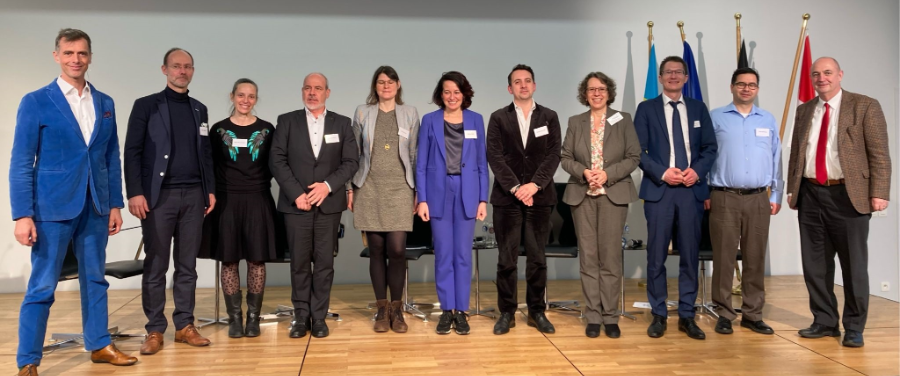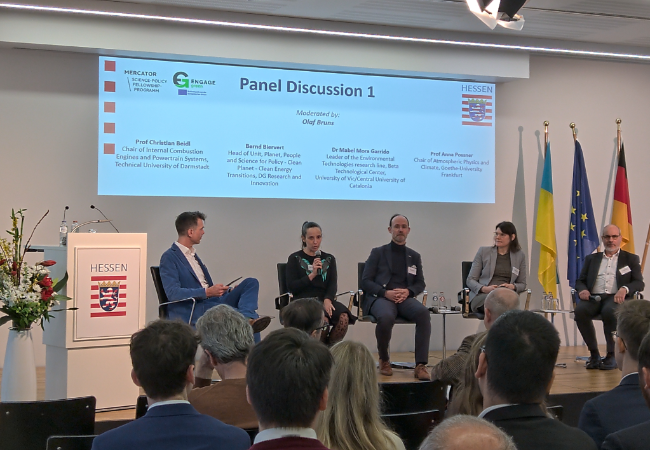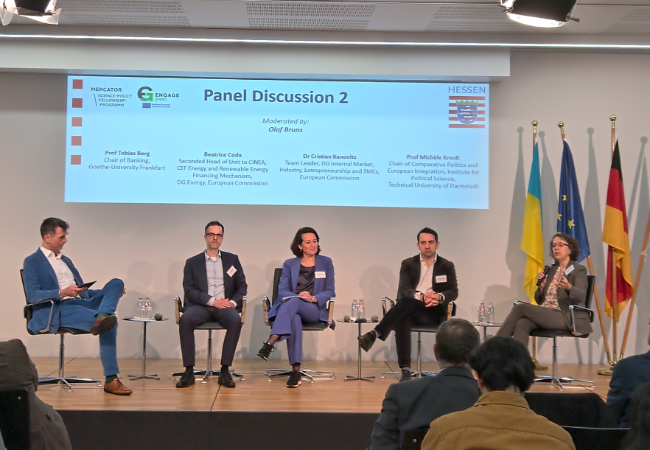- 01 Law
- 02 Economics and Business
- 03 Social Sciences
- 04 Educational Sciences (German)
- 05 Psychology and Sports Sciences
- 06 Protestant Theology
- 07 Roman Catholic Theology
- 08 Philosophy and History
- 09 Linguistics, Cultures, and Arts (German)
- 10 Modern Languages
- 11 Geosciences and Geography (German)
- 12 Computer Science and Mathematics
- 13 Physics
- 14 Biochemistry, Chemistry and Pharmacy
- 15 Biological Sciences
- 16 Medicine

A New Boost for Europe's Green Transition with R&I. Key technologies for our Future
Researchers and policymaking
professionals from the European Commission discuss technological potential and
challenges in Brussels
The universities of Frankfurt,
Darmstadt, Vic, and the Representation of the State of Hesse to the EU
organised a lunchtime event featuring two-panel discussions on key technologies
for the green transition. The Erasmus+
ENGAGEgreeen project and the Mercator
Science-Policy Fellowship-Programme of the
Rhine-Main-Universities organised the event.
Dr Mabel
Mora Garrido (Environmental Technologies
at the BETA Technological Center at the University of Vic) provided an overview
of the potential of organic waste. Professor Anna Possner (Atmospheric
Physics and Climate/Goethe-University Frankfurt) elaborated on the potential of
solar radiation management technologies and possible unintended side effects,
which might have detrimental effects on the environment. Professor Christian
Beidl (Head of the Institute of
Internal Combustion Engines and Powertrain Systems at Technical University
Darmstadt) stressed the importance of finding technical solutions for vehicles
addressing technical efficiency, reliability, and performance issues. Dr Bernd
Biervert (DG Research and Innovation) explained that the EU had earmarked 35
per cent of Horizon Europe for research on climate neutrality. The panellists
stressed the importance of considering societal needs when exploring
technological solutions to tackle climate change.
Professor Michèle
Knodt (Chair of Comparative
Politics and European Integration/Technical University Darmstadt) opened the
second panel by introducing technologies and solutions to generate and store
energy by heating iron powder without producing CO2, thereby
creating clean circles. Professor Tobias Berg (Chair of Banking at Goethe-University Frankfurt)
elaborated on the role of the banking sector in providing funding to develop
green technologies. Structural challenges in providing funding included the low
amounts of venture capital funding in Europe compared to the United States.
Beatrice Coda (CINEA and DG Energy/European Commission) elaborated on the
potential of EU support for new technologies and the challenges of putting new
technologies on the ground, like permitting procedures. Dr Cristian Kanovits
(DG GROW/European Commission) explained that technological progress was
exponential. The panellists discussed challenges like international competition
and the need for behavioural change.
Pictures: Julia Jost/Representation of the State of Hesse to the EU


- Studying at Goethe University
- International applicants
- Faculties
- Overview of study programmes
- Programme for refugees
- GRADE
- Goethe Business School (continuing education)
- Research at Goethe University
- Scientific news
- Goethe Welcome Center (for international researchers)
- Collaborative research projects
- Individual research
- Visiting fellowships
- Endowed chairs
- About the University
- News-in-brief
- University administration
- Campus locations
- Campus life
- University archives (German)
- Rhine-Main-Universities





